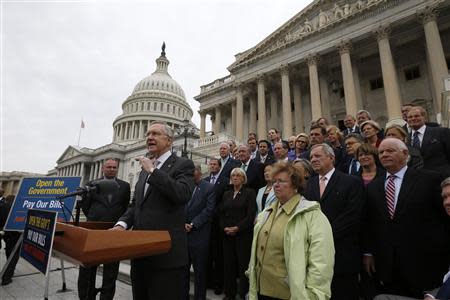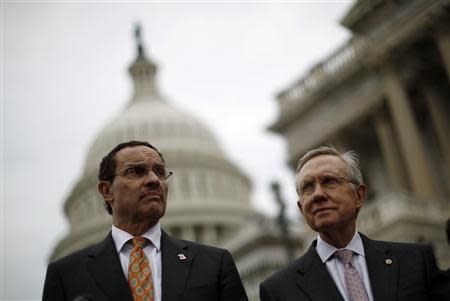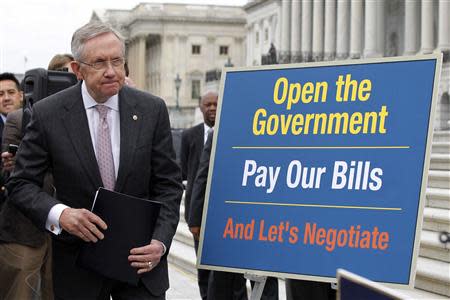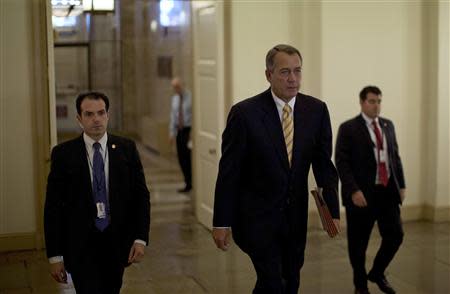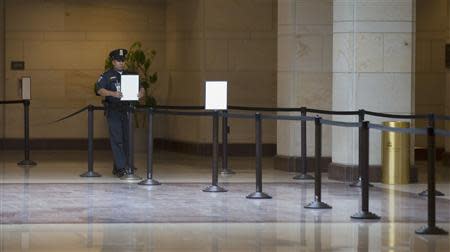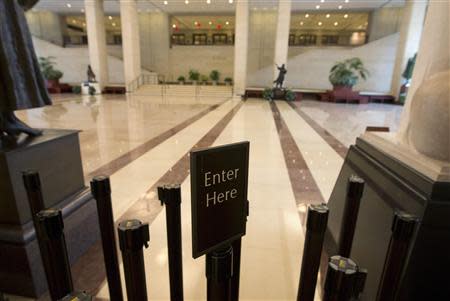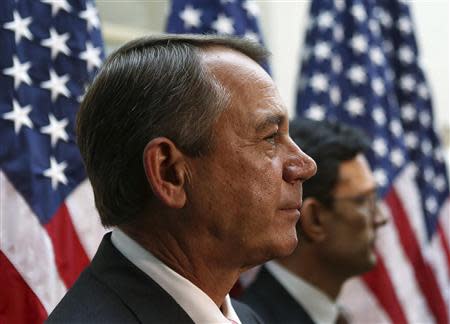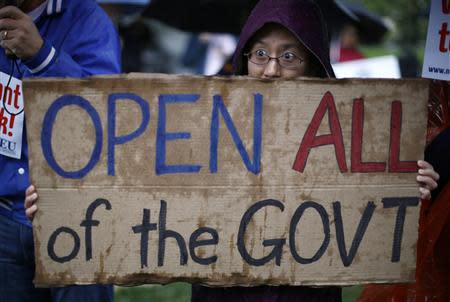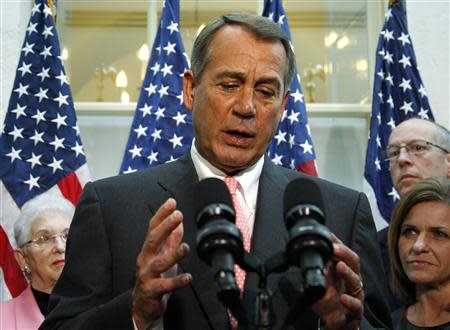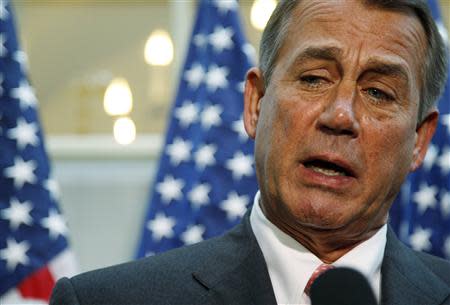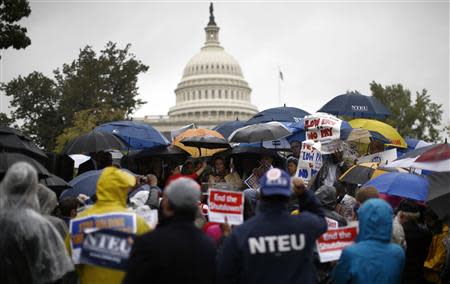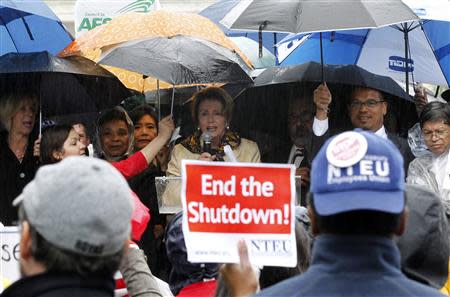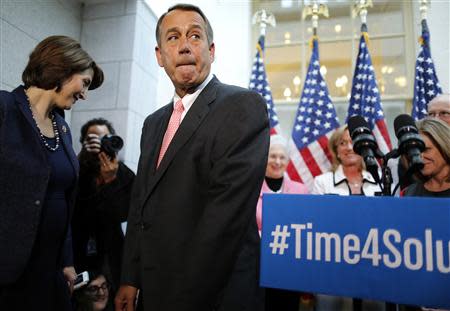Republicans offer plan to postpone any U.S. default
By Richard Cowan and Thomas Ferraro WASHINGTON (Reuters) - Republicans in the House of Representatives offered a plan on Thursday that would postpone a possible U.S. default, signaling new willingness to end a standoff that has shuttered large parts of the government and thrown America's future creditworthiness into question. Ahead of an afternoon meeting with President Barack Obama, House Republican leaders floated a measure to extend the government's borrowing authority for several weeks that appeared to be free of the restrictions on healthcare and spending that prompted the crisis. Their plan would not reopen the government, as Obama has insisted, but Republican leaders said they would seek a way to do so at the meeting, which is scheduled for 4:35 p.m. (2035 GMT). The White House said it would consider the offer. For the first time since the government shutdown began 10 days ago, senior lawmakers from both parties predicted they would be able to resolve their differences in a way that would allow both sides to claim victory. Outside conservative groups like Heritage Action and the Club for Growth, who have pressed Republicans to resist compromise, said they would not punish those who voted for the new plan. "It's all going to work out," said Republican Representative John Mica of Florida. Investors seemed to be heartened by the developments. U.S. stocks indexes closed up 2 percent on Thursday. The dollar hit a 2-week high against major currencies and benchmark crude oil had its biggest gain in 6 weeks. The proposal is a significant shift for Republicans, who had hoped to use the disruption to undermine Obama's signature healthcare law and win further spending cuts. Those goals remain, but the Republican offer would at least push off the threat of default from October 17 until possibly the middle or end of November. One potential complication: the plan would prevent the Treasury Department from shifting funds around to postpone the day of reckoning further. The White House cautiously welcomed the offer, but reiterated that Congress must first reopen the government before budget talks can begin. "The president is happy that cooler heads at least seem to be prevailing in the House," White House spokesman Jay Carney told reporters. Carney also cautioned that the White House has yet to see details of the Republican proposal. Many rank-and-file Republicans also appeared to be skeptical of Boehner's plan. Boehner's grip over his troops has been tenuous this year and many of the chamber's most conservative lawmakers have defied him repeatedly on other crucial votes. REBELLIOUS MEMBERS Boehner has taken pains to show his party's most rebellious members that he listens to their concerns. He took a different approach on Thursday, said those in the room. "He put his best Coach Boehner voice and demeanor on and said, 'Guys, this is what we are going to do. The play has been called. I'm happy to answer questions,'" said Republican Representative Tom Cole of Oklahoma. Other Republicans left the meeting grim-faced and refused to speak with reporters. The Obama administration says it will be unable to pay all of its bills if Congress does not raise the $16.7 trillion debt ceiling by October 17. Treasury Secretary Jack Lew said he would be unable to prioritize some payments over others among the 30 million transactions his department handles each week. "It would be chaos," Lew told the Senate Finance Committee. The Republican plan would postpone that day of reckoning by several weeks. That would give them more time to seek spending cuts, a repeal of a medical-device tax, or other measures they say are needed to keep the national debt at a manageable level. "It's better to negotiate and try and reach a solution than try to just win an all-out victory. That's not the way this place should work," said Republican Senator John McCain of Arizona. Democrats have called for a debt-ceiling hike that would extend government borrowing authority for more than a year. Still, they did not entirely dismiss the plan. "Let's see what they have offered," House Democratic Leader Nancy Pelosi said. The House could vote on the measure as early as Thursday, though the timing remained unclear. House leaders canceled a planned recess and said they would remain in Washington next week to keep working on the problem. Opinion polls indicate that Republicans appear to be getting more of the blame for the standoff. The Republican Party's approval rating now stands at a record low of 28 percent, according to Gallup, down 10 points from pre-shutdown levels. The Democratic Party's approval rating has dipped slightly to 43 percent. Business groups that have close ties to the Republican Party have also pressed for an end to the brinkmanship and some are laying plans to mount primary challenges next year to lawmakers who refuse to raise the debt ceiling. The Republican offer would do nothing to resolve conservative objections to Obama's healthcare reform law, the Affordable Care Act, which prompted the October 1 shutdown as Republicans pushed to delay or defund the law. Hundreds of thousands of federal employees have been out of work since then and individual businesses, from arms makers to motels, have begun to lay off workers as well. The Labor Department said on Thursday that 15,000 private-sector workers have filed for unemployment benefits due to the shutdown. House Republicans have passed bills that would reopen portions of the government and otherwise ease the pain of the shutdown, but they still hope to tie a full restoration of government funding to conditions that would undercut "Obamacare," as it is popularly known. The latest offer could complicate efforts to reopen the government, as conservatives may feel emboldened to dig in their heels further in return for extending the debt ceiling. House Republicans offered their plan after Heritage Action, said it would not oppose a short-term increase in the debt limit. Heritage Action said, however, it wants House Republicans to return the focus of the fight over the government shutdown to demands for a rollback in Obamacare. (Additional reporting by Jason Lange, Tim Reid, David Lawder, Steve Holland, Roberta Rampton and Mark Felsenthal; Writing by Andy Sullivan; Editing by Fred Barbash, Vicki Allen and Tim Dobbyn)

